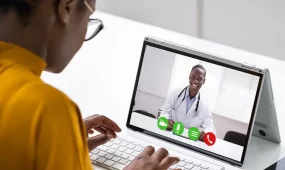Overview
It is common for children to burst into tears when they see nurses in their uniforms due to past frightening experiences. But as adults, we often come up with plenty of excuses before going to the doctor: ‘I just can’t stand the smell of disinfectant,’ or ‘The weather is horrible today, I’ll reschedule my doctor’s appointment.’ Do you ever catch yourself having such thoughts before a medical check-up? Perhaps without even realizing it, you are surrounded by fear of going to the doctor.
In medical terminology, the fear of visiting doctors is termed iatrophobia (eye-AT-rah-FO-bee-ah), and it requires assessment by a healthcare professional for diagnosis. However, it is crucial to understand that while not everyone meets the criteria for iatrophobia, many still experience varying degrees of anxiety about doctor visits. This anxiety impacts patients of all ages, even though their attending doctors and nurses have years of experience and have completed all the necessary training like an ABSN online.
To help you or your family members attend appointments smoothly, let’s delve into the symptoms, causes, and ways to cope with the fear of doctor visits.
Symptoms of Fear of Seeking Medical Treatment
We spoke to Dr. Shmaya Krinsky, Psychologist. He told us that, “People who fear going to the doctor or getting medical help often feel uneasy or panicky at the thought of medical appointments or tests. They might also experience physical symptoms like a racing heart, sweating, trembling, or nausea. Additionally, they might constantly worry about what could go wrong, find it hard to focus on daily tasks, or have trouble sleeping. Over time, these fears can lead to avoiding medical appointments or using safety behaviors like canceling appointments or seeking reassurance excessively, which can make things worse and impact their daily life.”
It is disappointing that the anxiety of seeking medical care could lead patients to procrastinate doctor visits, resulting in delayed treatment. In addition to psychological issues, patients with a fear of doctor visits may also exhibit some physiological symptoms:
- Dizziness.
- Dry mouth.
- Extreme feelings of dread or terror.
- Nausea.
- Profuse sweating (hyperhidrosis).
- Rapid breathing and heart rate or heart palpitations (a racing heart that may skip beats).
- Shaking or trembling.
If you experience the symptoms mentioned above before visiting the doctor, you may need to consider the possibility of having a fear of seeking medical care.
Reasons Behind the Anxiety
You might wonder: ‘I’m not an 8-year-old kid, is it normal to feel too scared to leave the house for a doctor’s visit?’ Don’t worry, you’re not alone – one survey found that 1 in 3 Americans avoids going to their doctor, even when they believe they need medical care. Various reasons could contribute to anxiety about doctor visits, stemming from your childhood experiences or negative experiences shared with family or friends. By exploring the following reasons, you might gain more insights about where your anxiety comes from.
- Underwent numerous doctor appointments and examinations during childhood to manage a health issue.
- Experienced inadequate medical treatment or had negative encounters with healthcare providers.
- Living with a persistent condition such as diabetes or a severe illness like cancer, and necessitating frequent and sometimes uncomfortable medical procedures.
- Received distressing news about your health or that of a loved one from a physician.
- Acted as a caregiver, accompanying a family member to frequent medical appointments and tests.
- Suffered the loss of a loved one due to a medical condition or accident while under a doctor’s care.
- Have a family background marked by phobias or anxiety disorders.
If any of these conditions resonate with you, remember to hug yourself first and know that it is not your fault. Now, let’s explore how to overcome the anxiety of doctor visits together.
Five Ways to Deal with the Fear of Seeking Medical Treatment
1. Avoid searching online before doctor visits to diagnose yourself blindly.
Perhaps you have a cold, but after searching online and comparing descriptions with other patients, you start suspecting yourself of having an incurable disease even before seeing the doctor. This not only fails to alleviate your anxiety but plunges you deeper into despair and helplessness, making you even more afraid to see the doctor. Remember always to seek help from professionals.
2. Schedule appointments at a time when you feel comfortable, or schedule to be the first patient.
If you tend to feel anxious in the mornings, you can opt for afternoon appointments to try to relax a bit more when entering the clinic. If you don’t mind being the first patient in the morning, go for it. This can reduce your waiting time, sparing you from seeing other patients’ painful facial expressions or continuously smelling disinfectant, potentially easing your psychological burden.
3. Confront your fears and communicate your concerns with your doctor.
Remember how in high school, repeatedly telling yourself not to be nervous before exams only made you more anxious? This applies to anxiety before doctor visits as well. Accept your fear and tell yourself, ‘I’m scared, but I still need to seek medical care because it’s essential for my health.’ You can also talk to your doctor because they may have ways to help ease your anxiety and address your concerns.
4. Utilize telemedicine instead of face-to-face consultations.
If you don’t necessarily need an in-person consultation, consider remote consultations through video, phone, or text chat appointments. In this case, you can stay at home or in other comfortable environments for your appointment. Not having to enter the clinic or face the doctor directly may make it easier for you to discuss your conditions, almost like chatting with a friend over the phone.
5. Seek support from family or friends.
Your doctor might allow you to hold hands with family members or friends during the appointment to help you relax and provide support. They not only serve as a comforting presence but also help you pay attention to important details told by doctors that you might miss in a tense state.
RELATED – A Comprehensive Guide to Naturopathy: Finding the Best Care for Your Body
We are all aware that managing anxiety while seeking medical care can be challenging for those who are fearful of seeing doctors. If your family or friends also struggle with fear and anxiety about doctor visits, it’s important not to blame them. Instead, offer understanding and support to help them attend appointments smoothly and promptly. If the strategies mentioned earlier don’t prove effective, seeking assistance from a professional psychologist is a beneficial approach to address anxiety related to doctor visits.







 This article changed my life!
This article changed my life!
 This article was informative.
This article was informative.
 I have a medical question.
I have a medical question.
 Ask a Question
Ask a Question

 This article contains incorrect information.
This article contains incorrect information.
 This article doesn’t have the information I’m looking for.
This article doesn’t have the information I’m looking for.